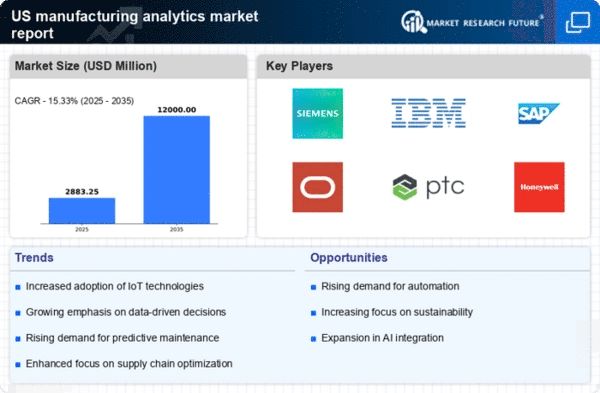Increased Focus on Quality Control
Quality control remains a pivotal driver in the manufacturing analytics market. As manufacturers face heightened scrutiny from consumers and regulatory bodies, the need for robust quality assurance processes has become more critical. Analytics tools that monitor production quality in real-time are becoming indispensable. By leveraging data analytics, manufacturers can identify defects early in the production cycle, reducing the costs associated with rework and returns. Reports indicate that companies utilizing analytics for quality control can reduce defect rates by as much as 30%. This emphasis on quality not only enhances customer satisfaction but also strengthens brand reputation, thereby driving growth in the manufacturing analytics market.
Integration of Supply Chain Analytics
the integration of supply chain analytics is a critical driver in the manufacturing analytics market. As supply chains become increasingly complex, manufacturers are turning to analytics to gain visibility and control over their operations. By analyzing data across the supply chain, companies can optimize inventory levels, reduce lead times, and improve demand forecasting. Recent studies suggest that organizations employing supply chain analytics can achieve a 15% reduction in inventory costs. This capability is vital for manufacturers aiming to enhance their responsiveness to market changes. The growing recognition of the importance of supply chain efficiency is likely to propel the adoption of analytics solutions within the manufacturing sector.
Rising Demand for Operational Efficiency
The manufacturing analytics market is experiencing a notable surge in demand for operational efficiency. Companies are increasingly seeking ways to optimize their production processes, reduce waste, and enhance overall productivity. This trend is driven by the need to remain competitive in a rapidly evolving market landscape. According to recent data, organizations that implement advanced analytics solutions can achieve operational cost reductions of up to 20%. As manufacturers strive to streamline their operations, the adoption of analytics tools that provide real-time insights into production metrics is becoming essential. This focus on efficiency not only improves profit margins but also positions companies favorably in the manufacturing analytics market, as they leverage data-driven decision-making to enhance their operational capabilities.
Regulatory Compliance and Risk Management
Regulatory compliance and risk management are becoming increasingly significant in the manufacturing analytics market. As regulations evolve, manufacturers must ensure adherence to various standards, which often necessitates the use of analytics for monitoring compliance. Analytics tools can help identify potential risks and ensure that manufacturing processes align with regulatory requirements. This proactive approach not only mitigates the risk of penalties but also enhances operational transparency. Data indicates that companies that leverage analytics for compliance can reduce audit-related costs by up to 25%. As the regulatory landscape continues to change, the demand for analytics solutions that support compliance and risk management is expected to grow, further driving the manufacturing analytics market.
Advancements in Data Analytics Technologies
Technological advancements in data analytics are significantly influencing the manufacturing analytics market. The emergence of sophisticated algorithms and machine learning techniques enables manufacturers to extract actionable insights from vast datasets. These innovations facilitate predictive maintenance, quality control, and supply chain optimization, which are critical for maintaining competitiveness. As per industry reports, the market for advanced analytics solutions is projected to grow at a CAGR of 25% over the next five years. This growth is indicative of the increasing reliance on data-driven strategies within the manufacturing sector. Consequently, manufacturers are investing in analytics technologies to harness the power of data, thereby enhancing their operational efficiency and decision-making processes.
















